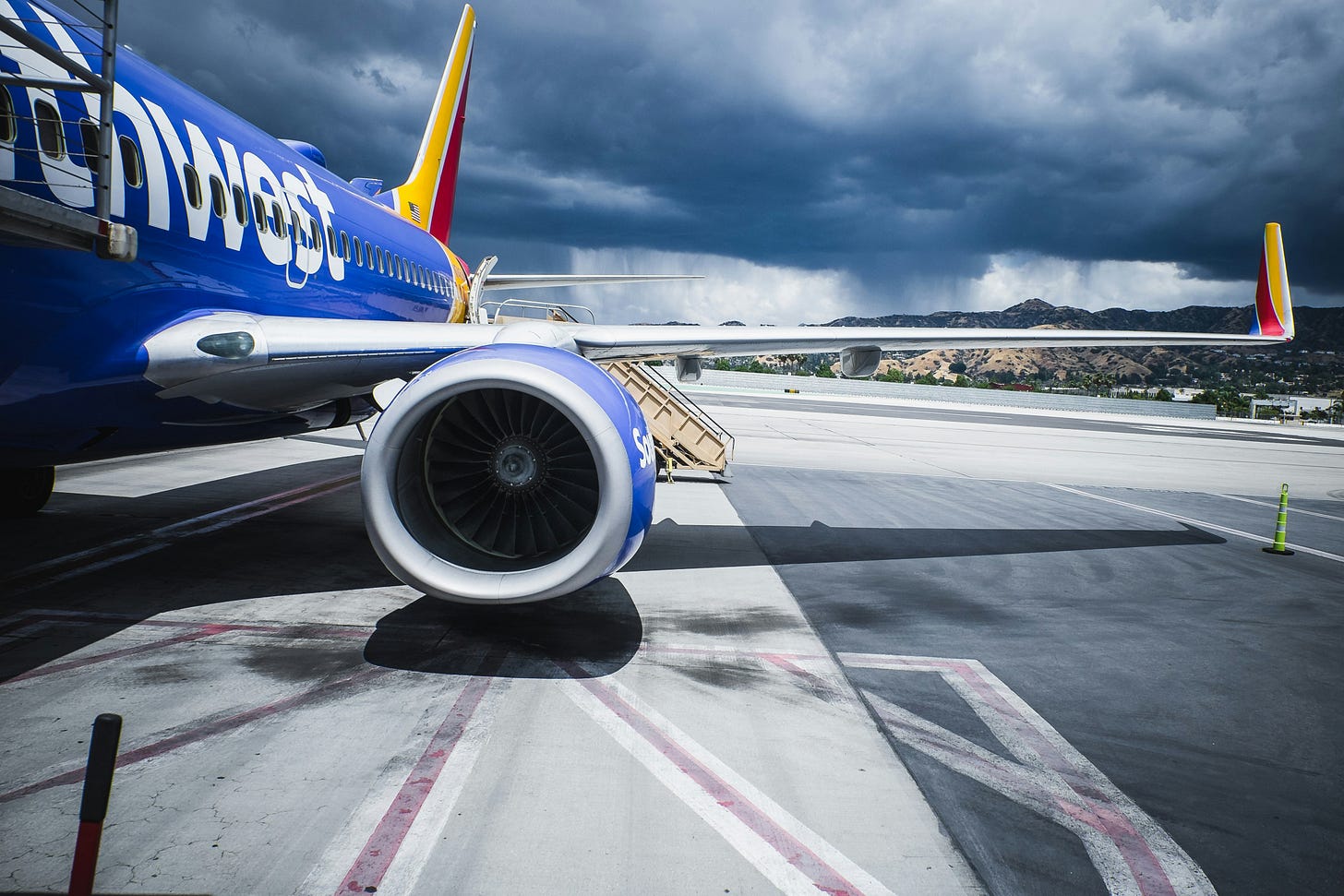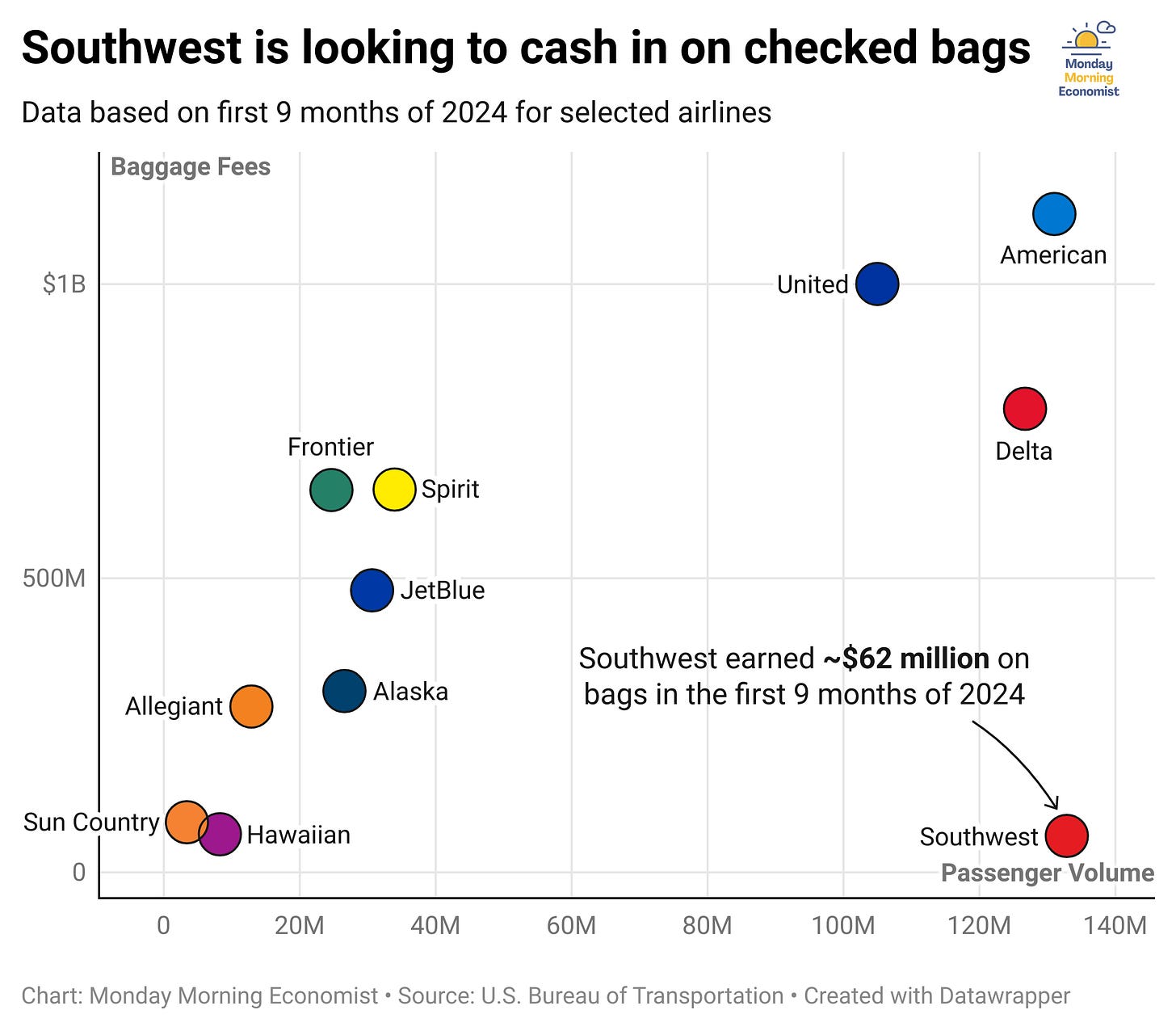There’s No Such Thing as Free Checked Bags
Southwest’s decision to charge for checked bags feels like a loss, but in reality, passengers were always paying for them—just in ways they didn’t see.
You’re reading Monday Morning Economist, a free weekly newsletter that explores the economics behind pop culture and current events. Each issue reaches thousands of readers who want to understand the world a little differently. If you enjoy this post, you can support the newsletter by sharing it or by becoming a paid subscriber to help it grow:

For decades, Southwest Airlines had a magic trick. It convinced millions of travelers that their checked bags were free. Two bags, no charge—no small thing in an era when most airlines nickel-and-dimed passengers for everything from seat selection to carry-ons.
The illusion will soon be over. Starting in May, Southwest will charge most customers for checked luggage. The exceptions? Business-class passengers, frequent fliers with elite status, and holders of the airline’s credit card.
Travelers are furious. Wall Street is thrilled. After the announcement, Southwest’s stock price jumped 9%, a sign that investors have been waiting for this moment. Baggage fees are a reliable revenue stream, and most major airlines adopted them years ago.
But here’s the thing: checked bags were never free. They were just baked into the price of your ticket. If you never checked bags, you were subsidizing the travelers who did. Now that Southwest is unbundling its pricing, customers are reacting not just to the new fee—but to the feeling of loss. It turns out, people don’t think rationally when it comes to pricing.
Revenue, Costs, and Why Airlines Charge for Bags
When a company changes how it charges customers, it’s usually for one of two reasons: to make more money or to spend less of it. Southwest estimates that baggage fees could bring in $1.5 billion a year. That’s a lot of money—until you consider that the airline also expects to lose $1.8 billion in business from customers who defect to competitors. So why do it?
One reason is investor pressure. Southwest has been struggling financially. It recently cut routes, laid off workers, and even scrapped its long-standing open-seating policy—all moves to trim costs and boost revenue. Charging for checked bags was the next obvious step.
Another reason is efficiency. Handling checked bags adds weight to planes, which increases fuel costs. More bags also mean longer turnaround times at the gate, more baggage handlers, and more chances for lost luggage. If Southwest can reduce the number of checked bags, it can cut costs on multiple fronts.
But the biggest reason for this shift isn’t just about making more money—it’s about market segmentation. By unbundling baggage fees, Southwest can introduce a cheaper base fare to compete with budget airlines. The idea? Let passengers sort themselves: those who want to fly as cheaply as possible can opt for bare-bones fares, while those who check bags pay their share.
In other words, this isn’t just a price hike—it’s an organizational shift in how Southwest does business. Twenty years ago, Southwest was one of the cheapest airlines in the country, but is now stuck between the major carriers and the budget airlines.
People Don’t Think Rationally About Free Things
People love free things—more than they should. Behavioral economics is a field of economics that explains why. One of its key insights? The zero-price effect: when something is free, we don’t evaluate its cost rationally. We just know it feels like a great deal, even when it isn’t.
Consider Amazon Prime. People love getting "free shipping," but they pay a membership fee for it. If Amazon suddenly cut product prices by a few bucks but started charging for shipping, customers would be outraged—even if they ended up paying less overall.
The same logic applies to airline baggage fees. Southwest could price its tickets at $300 with “free” bags or $240 with a $30 per-bag charge. Same total cost for people checking two bags, but very different customer reaction. The moment you separate the cost from the ticket, it stops feeling like a service and starts feeling like a penalty.
And this brings us to the reason people are so upset: loss aversion. We hate losing things more than we like gaining things of equal value. For decades, Southwest travelers believed they were entitled to two free checked bags. Now that those bags come with a price tag, it feels like something is being taken away—even if the total cost of flying may not change.
If Southwest had never offered free bags in the first place, no one would be mad about this. But because they did, people feel like something is being taken away. It’s not as much about the money as it is about the feeling of loss.
Light Travelers Were Always Subsidizing Heavy Packers
Here’s another uncomfortable truth: if you weren’t checking two bags, you were probably overpaying for your flight.
For years, Southwest baked the cost of baggage handling into every ticket price—whether you used it or not. That meant travelers who packed light were subsidizing the ones hauling two giant suitcases. It was a great deal for heavy packers. But for those who never checked a bag? Not so much.
By unbundling baggage fees, Southwest is moving toward a more pay-for-what-you-use model. And if you’re a carry-on-only traveler, this might be good news. The airline says it plans to introduce a new, lower-priced economy fare. That means passengers who don’t check bags could see lower base fares, while those who do will finally cover their costs rather than relying on other passengers to subsidize them.
This kind of market segmentation is already standard in the airline industry. Most major carriers let you buy the cheapest possible ticket and then pay extra for whatever you use—baggage, extra legroom, priority boarding. Southwest is simply catching up to a pricing model that better reflects individual choices.
Final Thoughts: Everything Has a Cost, Even at Zero Price
Southwest’s decision was always going to make people angry. For decades, passengers believed they were getting something for free. But every good economist will tell you that nothing is ever truly free.
Checked bags always had a cost. Sometimes it was built into the price of the ticket. Other times, we paid for it in longer turnaround times or extra minutes spent at the baggage carousel waiting for that last suitcase to appear. Either way, the cost was real—it just wasn’t obvious.
Now, that cost is visible. Some travelers will pay less by packing lighter and choosing a cheaper ticket. Others—especially those who maxed out the two-bag policy for the whole family—will pay more if they want to keep flying Southwest the same way they always have.
Maybe there was a better way to do this. Hotels faced a similar dilemma when they started scaling back daily housekeeping. Many travelers (myself included) were frustrated when post-pandemic hotels reduced cleaning rooms every day. But I’d be even more annoyed if they charged extra for it instead of offering a small discount for skipping housekeeping, the way some hotels do now.
If you had asked me five years ago which Southwest policy to kill, it wouldn’t have been the free checked bags. It would have been open seating, which—thankfully—is also going away. I hated awkwardly lining up in numerical order before the flight, hoping to avoid a middle seat when it was our group’s turn to board. Plenty of other people were willing to pay extra for a guaranteed window seat when that option became available, and now several others will have the choice on whether they want to haul a second suitcase through baggage claim.
But in the end, that’s what Southwest is banking on: that customers—once the frustration fades—will still choose what works best for them. Because when it comes to pricing, I’d always rather start with the lowest fare possible and pay for the extra perks I actually want.
Thank you for reading Monday Morning Economist! This free weekly newsletter explores the economics behind pop culture and current events. This newsletter lands in the inbox of more than 6,700 subscribers every week! You can support this newsletter by sharing this free post or becoming a paid supporter:
While Southwest previously allowed two checked bags per customer, each additional checked bag cost passengers $150 per bag [Southwest]
The three most stressful travel booking activities for Americans are booking airport transfers (46% find stressful), booking flights (45%), and selecting luggage allowance (41%), followed by booking accommodations and booking rental cars [Hotel Dive]
When traveling for leisure, 48% of Americans say cost and overall value are the most important factor [YouGov]








The problem from what I’ve seen is everyone turns into an asshole trying to fight for overhead bin space to avoid the fee, and I felt less stressed on SWA. That was the tradeoff in my experience.
"There ain't no such thing as a free checked bag." TANSTAAFCB. Maybe it's time for economist to update the old saying for the 21st Century!